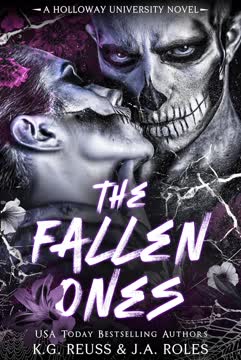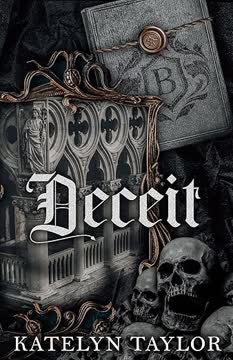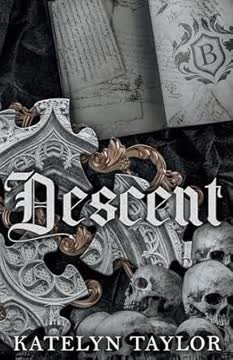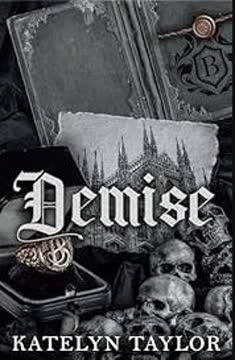Plot Summary
Secrets Beneath Hawthorne Hall
Elliot arrives at Hawthorne Hall, determined to uncover the truth behind her cousin Will's mysterious disappearance. She quickly realizes the brotherhood is a web of secrets, power, and dangerous games. Trust is a rare commodity, and every interaction is laced with suspicion. As she navigates the house's rules and rituals, she's forced to play along, all while searching for clues about Will. The tension between her and the senior brothers—Kingston, Cannon, and Archer—grows, especially as she discovers evidence that implicates them. Elliot's resolve is tested as she balances her need for answers with the emotional connections she forms, setting the stage for a high-stakes psychological and emotional journey.
The Brotherhood's Dangerous Games
Elliot is thrust into the brotherhood's brutal initiation games, designed to break and test new members. The games are more than tradition—they're a means of control, humiliation, and establishing hierarchy. Elliot faces physical and psychological challenges, including sabotage and targeted aggression from other initiates, especially Bridger. The games expose the darker side of Hawthorne Hall, where loyalty is demanded and weakness is punished. Through these trials, Elliot's resilience and intelligence shine, but the cost is high. The games also serve as a crucible, forging unexpected bonds between her and the senior brothers, even as suspicion lingers about their involvement in Will's fate.
Unraveling Will's Disappearance
Haunted by Will's absence, Elliot's investigation intensifies. She discovers Will's phone hidden in Kingston's room, raising disturbing questions about the brothers' knowledge and complicity. Paranoia sets in as she receives anonymous threats and realizes she's being watched. The brotherhood's silence about Will is deafening, and Elliot's trust in Kingston, Cannon, and Archer wavers. Her search for the truth becomes a dangerous game of its own, as she must decide how much to reveal and whom to trust. The emotional stakes rise as her feelings for the brothers deepen, blurring the line between ally and adversary.
Tangled Loyalties and Betrayals
Elliot's relationships with Kingston, Cannon, and Archer grow more complex. Each brother reveals vulnerabilities and hidden pain, drawing her closer even as evidence mounts against them. The brotherhood is fractured by internal rivalries, and Elliot is caught in the crossfire. She uncovers layers of betrayal—not just regarding Will, but also in the way the brotherhood polices itself and punishes dissent. The threat of violence is ever-present, and Elliot must navigate shifting alliances, using both her wits and her heart to survive. The emotional intensity of her connections with the brothers is matched only by the danger she faces from within the house.
The Initiation's Dark Side
The games escalate in cruelty, with Elliot targeted by both upperclassmen and fellow initiates. She's physically attacked, locked in a closet, and left unconscious—an ordeal that leaves her with a concussion and deep emotional scars. The brotherhood's leadership is forced to confront the toxic culture they've inherited, but justice is elusive. Elliot's suffering exposes the hypocrisy of the brotherhood's supposed values, and her determination to persevere inspires both admiration and resentment. The violence she endures becomes a catalyst for change, as the senior brothers begin to question their own complicity and the true meaning of loyalty.
Threats, Notes, and Nightmares
Elliot receives a series of threatening notes, intensifying her sense of isolation and vulnerability. The psychological toll of the games and the constant surveillance push her to the brink. Nightmares and flashbacks plague her, blurring the line between past trauma and present danger. The brothers respond with increased protectiveness, installing cameras and enforcing new rules, but the threats persist. Elliot's resilience is tested as she struggles to maintain her autonomy and sanity. The notes become a symbol of the unseen dangers lurking within Hawthorne Hall, and Elliot's quest for the truth becomes a fight for her own survival.
Bonds Forged in Fire
In the aftermath of violence and betrayal, Elliot and the senior brothers find solace in each other. Vulnerabilities are laid bare—Kingston's grief over his sister, Cannon's struggle with epilepsy and silence, Archer's hidden desires and guilt. These confessions create a powerful bond, transforming suspicion into trust and, eventually, love. The lines between friendship, loyalty, and desire blur as the four become entangled in a passionate, unconventional relationship. Their intimacy is both a refuge and a risk, as it exposes them to new dangers and forces them to confront the truth about themselves and each other.
The Auction at Bainbridge
The brotherhood is invited to a masked event at Bainbridge Hall, their rival. What begins as a glamorous party devolves into a predatory auction, where women are bid on for sexual favors under the guise of charity. Elliot is forcibly put on stage, and the brothers are forced to bid for her freedom. The event exposes the misogyny and corruption at the heart of elite institutions, as well as the lengths the brothers will go to protect Elliot. The night ends in violence and chaos, with the brothers rescuing Elliot and exacting retribution, but the trauma lingers, deepening their bonds and their resolve.
Violence, Rescue, and Reckoning
The aftermath of the auction is marked by violence and soul-searching. The brothers confront their own roles in perpetuating harm, and Elliot is forced to reckon with her feelings for them. Archer, Kingston, and Cannon each face personal demons—guilt, anger, and the fear of vulnerability. Their willingness to fight for Elliot, and for each other, becomes a turning point. The group's unity is tested by external threats and internal doubts, but their shared experiences forge a new sense of purpose. Healing begins, but the past is not so easily left behind.
Cannon's Hidden Struggles
Cannon's secret battle with epilepsy comes to light after a seizure witnessed by Elliot and the others. His silence and shame are rooted in years of bullying and trauma, and he fears rejection. Elliot's compassion and understanding help him accept himself, and the brothers rally around him. This revelation deepens their connection, as Cannon learns to trust and be vulnerable. The group's willingness to embrace his differences becomes a testament to the power of chosen family. Cannon's journey is one of self-acceptance, resilience, and the healing that comes from being truly seen.
Love, Lust, and Loyalty
The emotional and physical intimacy between Elliot, Kingston, Cannon, and Archer intensifies, culminating in a night of shared passion that redefines their relationships. Boundaries are crossed, and new forms of love and loyalty emerge. The group navigates jealousy, insecurity, and the fear of losing each other, but their commitment is unwavering. Their love becomes a source of strength, enabling them to face external threats and internal doubts. The unconventional nature of their relationship challenges societal norms, but within the walls of Hawthorne Hall, they find acceptance and belonging.
The Games Continue
The initiation games resume, with higher stakes and more dangerous obstacles. Elliot faces sabotage from Bridger and others, but also unexpected alliances with Taggart. The games become a metaphor for the larger battle for truth and justice within the brotherhood. As Elliot and her allies outwit their rivals, the true nature of the brotherhood is revealed—one shaped by tradition, secrecy, and the willingness to do whatever it takes to protect their own. The games test not only physical endurance but also moral courage, as Elliot must decide how far she's willing to go for answers.
Rivals, Allies, and Enemies
The brotherhood's internal divisions deepen, with some members supporting Elliot and others plotting against her. Bridger's escalating aggression and bigotry come to a head, resulting in violence and his eventual downfall. Taggart emerges as a surprising ally, while Dane's loyalties remain ambiguous. The group is forced to confront the legacy of past initiations, including Will's disappearance and the toxic culture that enabled it. As secrets are revealed and alliances shift, Elliot must navigate a minefield of rivalries, betrayals, and unexpected friendships.
The Truth About Will
Elliot's investigation into Will's disappearance reaches a critical point. She uncovers evidence of a secret relationship between Will and Dane, as well as the brotherhood's efforts to cover up the truth. The revelation is both a relief and a heartbreak, as it exposes the cost of secrecy and the pain of unrequited love. Elliot is forced to confront her own motivations and the limits of justice within a corrupt system. The truth about Will becomes a catalyst for change, as the group vows to break the cycle of silence and protect each other at all costs.
The Final Test
The last initiation game is the most dangerous yet, pushing Elliot and the others to their limits. Sabotage, violence, and betrayal threaten to undo everything they've built. The game becomes a crucible, forcing each character to confront their deepest fears and desires. Elliot's victory is hard-won, but it comes at a cost—her sense of safety, her trust in others, and her belief in the possibility of justice. The final test is not just about survival, but about the willingness to fight for what matters most.
Unmasking the Real Threat
As the dust settles, the true nature of the threats facing Elliot and the brotherhood is revealed. The anonymous notes, the sabotage, and the violence are traced to those closest to home. Dane's secrets come to light, and the group is forced to confront the reality that danger can come from within. The brotherhood's legacy is one of both protection and harm, and Elliot must decide whether to stay and fight for change or walk away. The unmasking of the real threat is both a victory and a tragedy, as it exposes the cost of silence and the need for accountability.
Love in the Shadows
In the aftermath of trauma and revelation, Elliot and the brothers find solace in each other. Their love, unconventional and hard-won, becomes a source of healing and hope. They commit to building a new kind of brotherhood—one based on honesty, acceptance, and mutual support. The scars of the past remain, but they are no longer defined by them. Together, they face the future with courage, determined to protect each other and create a home where everyone belongs. Love in the shadows becomes a beacon of light, guiding them through the darkness.
The Cliffhanger Abduction
Just as Elliot begins to find peace and belonging, she is betrayed and abducted by an unknown assailant—someone who knows about her investigation into Will and her growing influence within the brotherhood. The abduction is a brutal reminder that the past is never truly buried, and that the fight for justice is far from over. The novel ends on a cliffhanger, with Elliot's fate uncertain and the brotherhood rallying to save her. The stage is set for a new battle, as love, loyalty, and truth are put to the ultimate test.
Characters
Elliot Ashford
Elliot is a fiercely intelligent and determined young woman driven by the need to uncover the truth behind her cousin Will's disappearance. Her entry into Hawthorne Hall is both a mission and a personal reckoning, as she battles trauma from her past, including self-harm and a toxic ex. Elliot's resilience is matched by her vulnerability—she craves connection but fears betrayal. Her relationships with Kingston, Cannon, and Archer are complex, blending suspicion, desire, and genuine affection. Elliot's journey is one of self-discovery, as she learns to trust, love, and fight for herself and those she cares about. Her presence challenges the brotherhood's traditions and exposes the cost of silence and complicity.
Kingston Hawthorne
Kingston is the head of Hawthorne Hall, carrying the weight of tradition, responsibility, and personal loss. His sister's death haunts him, fueling both his protectiveness and his guilt. Kingston is authoritative, disciplined, and fiercely loyal, but beneath his commanding exterior lies deep vulnerability. His relationship with Elliot is transformative, forcing him to confront his own capacity for love and change. Kingston's struggle is between upholding the brotherhood's legacy and forging a new path—one that values honesty, compassion, and justice. His evolving bond with Archer adds another layer of complexity, as he learns to embrace all facets of his identity.
Cannon Cole
Cannon is the strong, silent type, communicating more through actions than words. His epilepsy and history of bullying have left him guarded and ashamed, but also fiercely resilient. Cannon's journey is one of self-acceptance, as he learns to trust Elliot and the other brothers with his vulnerabilities. His protectiveness of Elliot is both instinctual and deeply emotional, and their connection is rooted in mutual understanding and healing. Cannon's struggle with speech is both a literal and metaphorical barrier, one that he gradually overcomes through love and trust. His presence grounds the group, offering stability and unwavering loyalty.
Archer
Archer is the intellectual and emotional glue of the group, using humor and insight to navigate the brotherhood's complexities. His bisexuality and hidden desires add depth to his character, as he grapples with shame, longing, and the fear of rejection. Archer's relationship with both Elliot and Kingston is transformative, allowing him to embrace his true self and find acceptance. He is a natural problem-solver, always watching, listening, and intervening when needed. Archer's journey is one of self-revelation, as he moves from the periphery to the center of the group's emotional life, forging bonds that transcend traditional boundaries.
Will Whitlock
Will's disappearance is the central mystery driving the narrative. Though absent, his presence is felt in every chapter—through Elliot's memories, the brotherhood's silence, and the clues she uncovers. Will's secret relationship with Dane and his struggles within the brotherhood add layers of tragedy and complexity. He represents both the cost of secrecy and the hope for justice. Will's fate is a mirror for Elliot's own journey, as she confronts the dangers of silence and the need for truth.
Dane
Dane is a quiet, observant member of the brotherhood whose true loyalties are unclear. His secret relationship with Will and his reluctance to share the truth make him both a potential ally and a source of suspicion. Dane's struggle is between self-preservation and doing what's right, as he navigates the brotherhood's toxic culture and his own fears. His interactions with Elliot are marked by both kindness and evasiveness, reflecting his internal conflict. Dane's journey is one of coming to terms with his identity and the consequences of silence.
Bridger
Bridger is the primary antagonist among the initiates, embodying the worst aspects of the brotherhood's culture—misogyny, bigotry, and violence. His relentless targeting of Elliot, including physical attacks and sabotage, makes him a constant threat. Bridger's actions force the group to confront the legacy of harm within their ranks and the need for accountability. His eventual downfall is both a victory and a warning, illustrating the dangers of unchecked power and prejudice.
Taggart
Taggart begins as a background character but emerges as a key ally for Elliot. His willingness to work with her, even at personal risk, demonstrates the possibility of change within the brotherhood. Taggart's journey is one of growth and courage, as he chooses integrity over conformity. His alliance with Elliot is a beacon of hope, suggesting that the brotherhood can be redeemed from within.
Alec
Alec is a senior member of the brotherhood who oscillates between enforcing tradition and questioning its value. His relationship with Bridger and the other juniors is fraught with tension, and his interactions with Elliot are marked by both hostility and grudging respect. Alec represents the internal conflict within the brotherhood—between loyalty to the past and the need for change.
Stuart
Stuart is one of the most vocal opponents of Elliot's presence, participating in threats, sabotage, and psychological warfare. His actions are driven by resentment and a desire to maintain the status quo. Stuart's hostility forces Elliot and the others to confront the dangers of exclusion and the need for solidarity. His eventual marginalization is a testament to the power of collective action and the importance of standing up to bullies.
Plot Devices
Initiation Games
The initiation games are the central narrative device, structuring the plot and providing a framework for character development, alliances, and betrayals. Each game is designed to test not only physical endurance but also psychological resilience, moral courage, and the ability to navigate complex social dynamics. The games serve as both a metaphor for the larger battle for truth and justice within the brotherhood and a literal battleground where power is contested. They also provide opportunities for foreshadowing, as the dangers and secrets of the past are mirrored in the present.
Anonymous Threats and Sabotage
The series of anonymous notes and acts of sabotage against Elliot create a pervasive sense of danger and paranoia. These threats serve to isolate her, heighten the stakes, and force the brothers to confront their own complicity. The notes are a classic device for foreshadowing, hinting at the presence of enemies both within and outside the brotherhood. The eventual revelation of the source of the threats is a key turning point, unmasking the real dangers and forcing a reckoning.
Hidden Evidence and Secrets
The discovery of Will's phone, the hidden relationships, and the layers of secrecy within the brotherhood drive the plot forward. These secrets are revealed gradually, through a combination of investigation, confession, and confrontation. The use of hidden evidence creates suspense and allows for multiple twists, as characters' true motives and histories are brought to light. The slow unraveling of the truth about Will is both a narrative engine and a source of emotional catharsis.
Multiple Perspectives and Shifting Alliances
The narrative alternates between different points of view, providing insight into the inner lives of Elliot, Kingston, Cannon, and Archer. This structure allows for a nuanced exploration of loyalty, guilt, desire, and fear. Shifting alliances and betrayals keep the reader off-balance, mirroring Elliot's own uncertainty about whom to trust. The use of multiple perspectives also enables the author to explore themes of masculinity, vulnerability, and the possibility of change from within.
Cliffhanger Ending
The novel ends with a dramatic abduction, leaving Elliot's fate uncertain and setting up the next installment. This cliffhanger is both a narrative hook and a thematic statement—the fight for truth and justice is ongoing, and the dangers of silence and complicity are ever-present. The unresolved ending ensures that the emotional and narrative stakes remain high, compelling the reader to continue the journey.
Analysis
Leila James's Cannon is a dark, emotionally charged exploration of power, trauma, and the search for truth within elite institutions. At its core, the novel interrogates the cost of silence—how secrets, both personal and collective, can destroy lives and perpetuate cycles of harm. Through Elliot's relentless quest to uncover what happened to her cousin Will, the story exposes the toxic traditions of the brotherhood, the dangers of unchecked privilege, and the ways in which love and loyalty can both heal and wound. The initiation games serve as a powerful metaphor for the trials of coming of age in a world rife with betrayal and violence, while the unconventional romance at the heart of the novel challenges norms and offers a vision of chosen family as a source of strength. The book's modern relevance lies in its unflinching portrayal of misogyny, homophobia, and the struggle for justice within closed systems. Ultimately, Cannon is a story about survival—not just of the body, but of the spirit—and the transformative power of vulnerability, honesty, and love. The cliffhanger ending is a reminder that the fight for truth is never over, and that the greatest threats often come from those closest to us.
Last updated:
Review Summary
Cannon by Leila James is the second book in The Brothers of Hawthorne Hall series. Readers praise its character development, intense plot, and steamy scenes. Many consider it better than the first book, with a 4.28 overall rating. The story continues Elliot's journey with Kingston, Archer, and Cannon, exploring their evolving relationships and uncovering secrets. Fans appreciate the spicy content, including MM and MFMM scenes. The book ends on a cliffhanger, leaving readers eagerly anticipating the final installment.

















